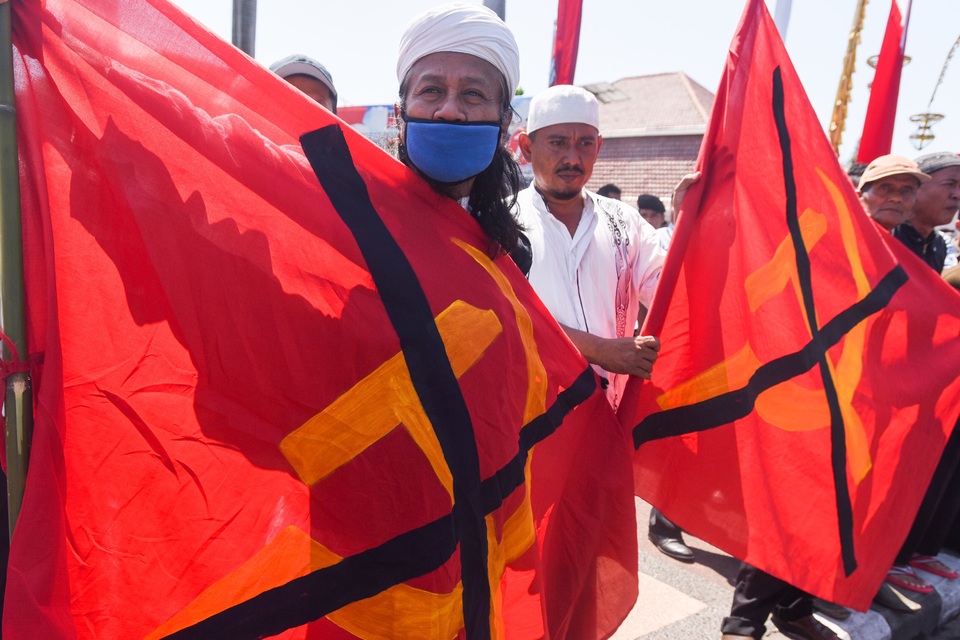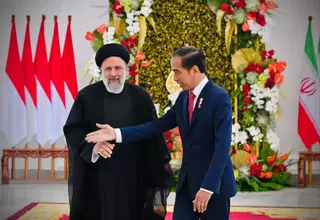Johannes Nugroho: Dispelling Myths About Indonesia's Communist Purge Pt. 2

This piece is a follow-up to Johannes Nugroho's earlier column on the myths surrounding the country's communist purge
An important point in the Communist Party of Indonesia's, known as PKI, strategy under Aidit — the accumulation of the largest possible membership — had a big role to play in securing alliances for the party. Often touted as the third largest communist party in the world during its heyday with 3 million signed-up members, the PKI used its strength on paper as a bargaining tool with both the PNI and President Sukarno.
Yet, astonishingly, when its enemies closed in for the kill in 1965, the PKI appeared helpless in stemming the tide. Once again the 1950-51 specter of the lack of class struggle consciousness came to haunt. The meekness with which many purge victims reacted to their demise has been used as evidence of the party’s pacifist bend. Many PKI sympathizers were probably non-violent citizens but the overall picture was decidedly more complex.
To explain why many PKI leaders took their fates lying down, we must delve into the nature of socio-political cleavages and loyalties in Indonesia. Rather than ideological conviction, it relies heavily on kinship, peer pressure and the strength of personalities. The PKI’s own growth, for one, could not have taken place without the personal endorsement of president Sukarno, a charismatic leader loved by Indonesians.
Locally, for instance, if the village chief in a given village inclined towards supporting the PKI, most of the villagers under him would probably declare for the party, even if they did not necessarily understand what its platform was. In this sense, membership numbers of most Indonesian organizations, then and now, are probably suspect at best, inaccurate at worst.
Many would have joined because of the socio-economic benefits promised. Others may have agreed with the party platform partially. Most sympathizers of the PKI, including members of its affiliated bodies such as its women activist organization Gerwani and its literary and performing arts movement Lekra, would belong to this category, quite distinct from its elite.
In this light, the unfounded rumors spread by the PKI’s enemies that Gerwani members had mutilated and castrated the military generals arrested in the 30 September Coup were pernicious in intent. The rumors were further perpetuated by pro-army journals at the time and sealed in iron by the propaganda film Pemberontakan G30S/PKI, made with president Suharto’s blessing. Subsequent testimonies including those by the doctors performing the post mortem on the generals’ bodies found no evidence of mutilation let alone castration.
What we must bear in mind is that it was indeed a time of confusion and hearsay. The increasingly poor health of President Sukarno, the PKI’s main protector, was, for example, kept a secret. Frank Palmos testified that on 4 Aug. 1965 president Sukarno had collapsed when conducting foreign journalists on a tour of the palace, ironically in a bid to brush off rumors of ill health. But Palmos said the news of the president’s collapse was never reported as it would have meant instant expulsion of the foreign journalist responsible.
By then, the PKI had alienated most of its allies, save the president. Its 1964-65 agrarian agitation in rural areas, known as Aksi Sefihak (Unilateral Action) was bitterly resisted by a combination of landed peasants, the priyayi and santri alike, especially in Central and East Java. Basing its action on the new land reform law passed in 1960, the PKI elite ordered its supporters in rural areas to hold demonstrations, public petitions and even forcible seizures of land and crops with the ultimate goal of effecting land redistribution for the landless peasants.
Again, the lack of existence of class struggle in rural Java worked against the PKI. It also impinged on the economic interests of many pesantrens or religious schools many of which had sizeable tracts of land, which the PKI insisted be broken up and redistributed. Yet again, the clashes, in many cases bloody and violent, occurred along the traditional santri-abangan lines rather than class struggle.
The agrarian campaign also aggrieved many priyayi supporters within the PNI, only to be made worse by the PKI’s maneuvers in August 1965 to have senior members of the PNI including the vastly popular Muhammad Isnaeni expelled on suspicion of being “anti-communist and anti-revolution.”
For its part, the army blamed the communists for driving the president into China’s lap at the expense of ties with the West, particularly the US. Deprived of military hardware of supplies due to the American embargo, it saw the Jakarta-Beijing axis as detrimental to its own interests.
The final straw may have been the Chinese PM Zhou Enlai’s suggestion of arming Indonesian peasants and workers to form the Fifth Armed Force, which was a clear challenge to the supremacy of the army. It did not help that the suggestion came from a foreign power, given Indonesia’s long allergy to foreign domination and latent Sinophobia. In many ways, the PKI painted itself into a corner and doomed its own future.
While the PKI’s ruthlessness in the 1960s power play among Indonesia’s elites is in no doubt, it is fair to say that the ordinary left-wing sympathizers who were massacred, imprisoned, raped and so on were innocent of any complicity. It is to these people that the government owes its apology, not to the PKI as an entity. Mistaking one for the other is the greatest error of judgment in the debate.
Tags: Keywords:POPULAR READS
President Jokowi Urges Global Restraint as Tensions Rise in the Middle East
President Joko "Jokowi" Widodo emphasized the importance of diplomatic efforts to prevent the escalation of conflict in the Middle EastKPK Identifies Sidoarjo Regent as Suspect in Corruption Probe
KPK has identified Ahmad Muhdlor Ali as a suspect in a corruption case involving the Sidoarjo Regional Tax Service AgencyEconomic Concerns Overshadow Security Worries for Indonesians in Iran
Indonesian citizens currently in Iran are more concerned about rising inflation than the security situation in the country.'Siksa Kubur' Review: Indonesian Horror with Solid First Act
The beginning part of "Siksa Kubur" is incredibly solid across many fields, including the visual storytelling.IDX Slides 2 Percent as Geopolitical Conflict Rattles Market Confidence
The IDX attributed the subdued performance of the index at the start of the week to the escalating geopolitical tensions in the Middle EastPopular Tag
Most Popular






















